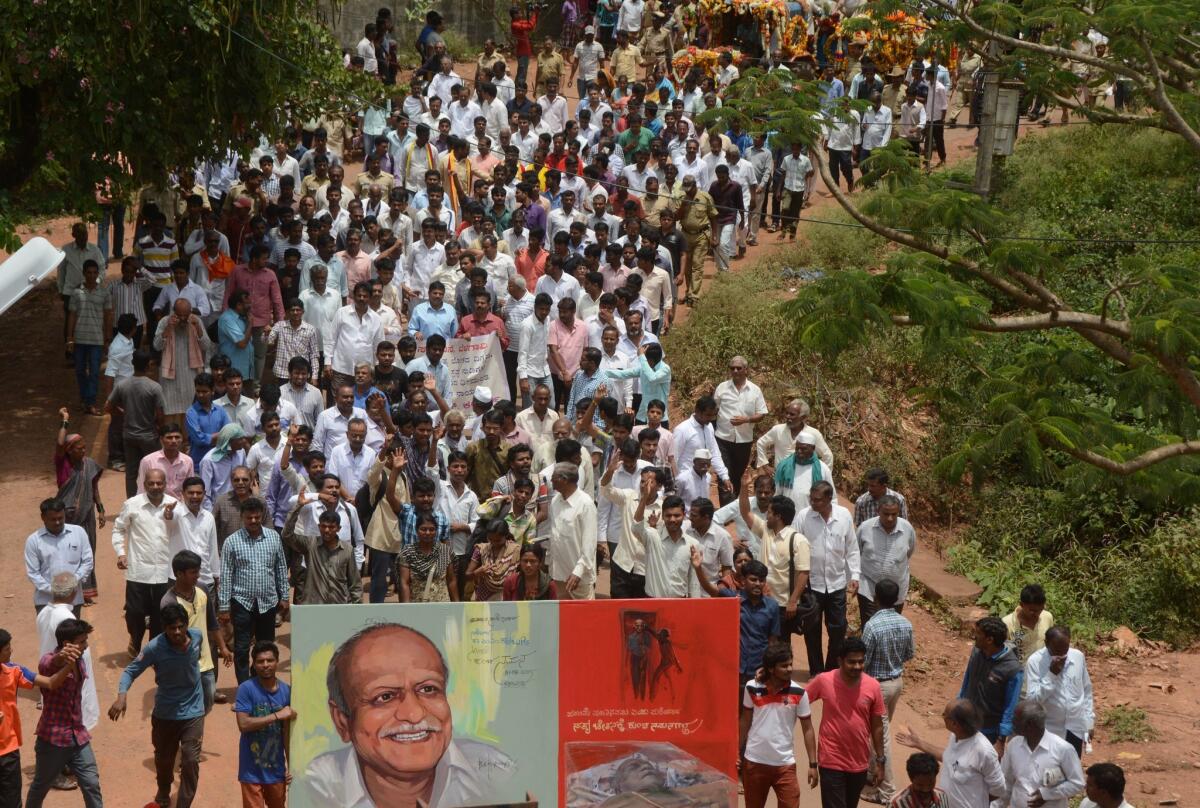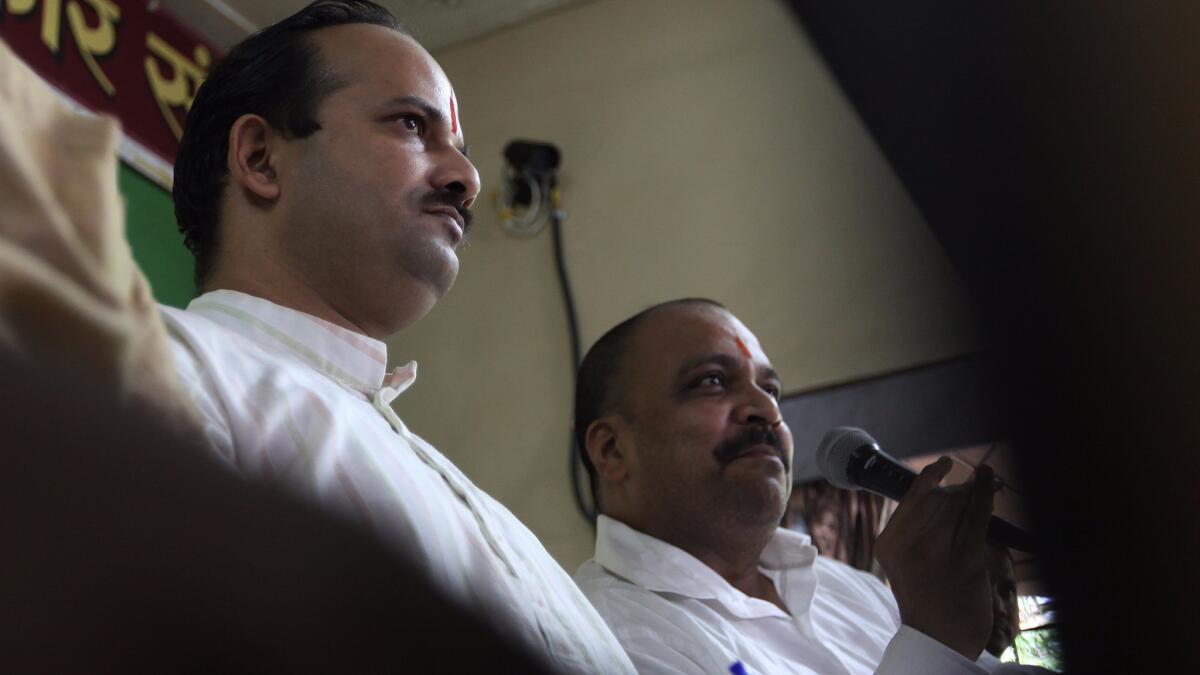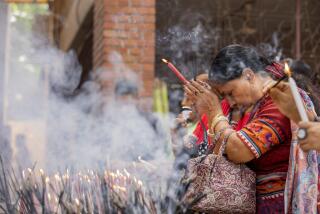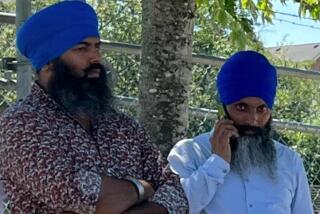A fringe Hindu group that believes in a divine kingdom is suspected in the deaths of Indian secularists

- Share via
Reporting from Mumbai, India — Abhay Vartak aspires to live in a divine kingdom in which everyone is truthful and virtuous, leaving no room for violence or crime. Justice would be dispensed by a benevolent king, as it was during the rule of the Hindu god Ram, according to mythological Hindu texts.
Vartak, who holds a bachelor’s degree in science, is the spokesman of Sanatan Sanstha, a radical Hindu organization in India that aims to establish the kingdom by 2023. According to its newsletter, Sanatan Prabhat, the intervening years will be a time of psychological and physical battles against evil forces that will prepare people for the advent of the holy kingdom.
Asked to define the evil forces, Vartak described them as people who develop “increased egos and personality defects and can’t lead a normal life.”
The Hindu fringe group, with its cult-like beliefs and behaviors, has a following in three states in southwestern India. It has emerged as the prime suspect behind the murders of three prominent secular thinkers in recent years.
Violence against evil is not violence.
— Sanatan Sanstha official text
Indian authorities in June arrested a Sanatan member in connection with the 2013 assassination of activist Narendra Dabholkar. In September, another Sanatan member was arrested for the 2015 killing of author and politician Govind Pansare, 81.
The Central Bureau of Investigation, India’s FBI, said the weapons used in those two killings matched those used in the 2015 deadly attack against a third prominent secular figure, academic M.M. Kalburgi. In all three slayings, the killers accosted their victims on motorbikes.
All the victims had come into conflict with orthodox Hindus. Dabholkar, 68, had led a campaign in the western state of Maharashtra to pass an anti-superstition bill aimed at reducing the influence of gurus and so-called godmen.
Pansare wrote a biography of Shivaji, a beloved 17th century warrior-king, that emphasized his religious tolerance and acceptance of minority Muslims into his army.
Kalburgi spoke out against religious superstition and blind faith before being shot in September at his home in Karnataka state.

Sanatan denies any link to the killings, but investigators say they found incriminating emails on a laptop belonging to one of the suspects, Virendra Tawde, the alleged mastermind of the Dabholkar assassination.
CBI officials said the emails suggest that Sanatan was attempting to organize an army of 15,000 people against “anti-Hindu forces.” One former Sanatan member has told the CBI and investigators from Maharashtra’s state police that Tawde approached him asking for two revolvers and had dispatched men to track Dabholkar and Pansare.
The day after Dabholkar was shot, Sanatan’s newsletter ran a front-page statement saying that his death was a blessing. Pansare later received an anonymous letter that read, “You will meet Dabholkar’s fate.”
Read how secular thinkers are coming under attack in India »
Violence by Hindu groups receives less attention than other forms of extremism in India, an overwhelmingly Hindu nation of 1.25 billion people. Sanatan’s official text says, “violence against evil is not violence.”
Vartak says the group teaches self-defense, but not the use of dangerous weapons. But according to a media report, a Sanatan worker told anti-terrorism police of a 2009 meeting where an explosives demonstration was held and one member said Hindus needed to learn to shoot rifles because they were being oppressed.
Established as a charitable trust in 1990 by hypnotherapist Jayant Athavle, Sanatan is based in the coastal state of Goa and maintains strict secrecy around the ashrams it operates.
Its website claims that long hair can reduce sperm count in men. Members refer to Athavle as “his holiness,” and believe that a special scent emanates from one of his fingers.
According to associates, Athavle lived in London in the 1970s, where he learned to practice a form of hypnosis developed by Milton H. Erickson, an American psychiatrist.
Shyam Manav, 64, a practicing hypnotherapist and anti-superstition activist, said he referred patients to Athavle around 1990 only to have them come back upset, complaining he had advised them to cure their health problems through prayer.
Manav reduced his contact with Athavle. A few years later, he learned that Athavle had acquired vibrating alarm clocks – then a luxury item in India – from overseas and tricked unsuspecting people in rural Maharashtra into thinking he caused the devices to shake merely by staring at them.
“At that point I realized Athavle had renounced honesty as well,” Manav said.
See the most-read stories in World News this hour >>
In 2008 Sanatan members were arrested in connection with a bombing outside a theater screening a film about the Mughal king Akbar, where seven were injured, and another outside an auditorium showing a satire of Hindu mythology.
Two Sanatan members were sentenced to 10 years imprisonment in 2011 but were released on bail two years later.
In 2009, six Sanatan devotees were arrested for a blast near a church in Goa. The explosives detonated prematurely, killing two Sanatan members who were carrying them on a motorbike. The six were acquitted on legal technicalities – but two men who allegedly masterminded the plot are wanted in connection with the recent killings.
In 2011 the Maharashtra state government submitted a lengthy dossier to New Delhi, calling for a ban on the group. The request was ignored, and the group continues to operate.
Investigative journalist Rana Ayyub, who has followed Sanatan, said that some Muslim groups accused of less serious crimes – such as the Students Islamic Movement in India – have been outlawed, suggesting a double standard when it comes to organizations with Hindu roots.
“While [Hindu militancy] is as much of a danger as other forms of terrorism, it is sadly still considered an aberration and not a norm,” Ayyub said.
Ayyub, who in 2009 disguised herself to gain entry into Sanatan’s sprawling ashram in Goa, described an atmosphere full of ritual and confusing practices. Children roamed around seemingly in a trance, wearing white stickers on their foreheads to supposedly ward off evil spirits, she said. A saffron-colored map was laid out, marking the group’s purported kingdom.
“They have their own world, their own pledge, their own way of life,” Ayyub said. “It all seemed very dangerous.”
Parth M.N. is a special correspondent.
MORE WORLD NEWS
Chinese activist charged with ‘subversion’ for attending a meeting and a conference
Olympics security: What Brazil had to learn about terrorism
More to Read
Sign up for Essential California
The most important California stories and recommendations in your inbox every morning.
You may occasionally receive promotional content from the Los Angeles Times.










